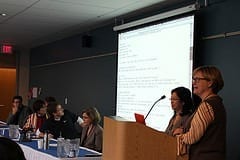
Massive Open Online Courses might seem like best way to use the Internet to open up education, but you’re thinking too small. Technology can turn our entire lives into learning experiences.
This probably sounds familiar: You are with a group of friends arguing about some piece of trivia or historical fact. Someone says, “Wait, let me look this up on Wikipedia,” and proceeds to read the information out loud to the whole group, thus resolving the argument. Don’t dismiss this as a trivial occasion. It represents a learning moment, or more precisely, a microlearning moment, and it foreshadows a much larger transformation–to what I call socialstructed learning.
Socialstructed learning is an aggregation of microlearning experiences drawn from a rich ecology of content and driven not by grades but by social and intrinsic rewards. The microlearning moment may last a few minutes, hours, or days (if you are absorbed in reading something, tinkering with something, or listening to something from which you just can’t walk away). Socialstructed learning may be the future, but the foundations of this kind of education lie far in the past. Leading philosophers of education–from Socrates to Plutarch, Rousseau to Dewey–talked about many of these ideals centuries ago. Today, we have a host of tools to make their vision reality.
Think of a simple augmented reality app on your iPhone such as Yelp Monocle. When you point the phone’s camera toward a particular location, it displays “points of interest” in that location, such as restaurants, stores, and museums. But this is just the beginning. What if, instead of restaurant and store information, we could access historical, artistic, demographic, environmental, architectural, and other kinds of information embedded in the real world?
This is exactly what a project from USC and UCLA called HyperCities is doing: layering historical information on the actual city terrain. As you walk around with your cell phone, you can point to a site and see what it looked like a century ago, who lived there, what the environment was like. Not interested in architecture, passionate about botany and landscaping instead? The Smithsonian’s free iPhone and iPad app, Leafsnap, responds when you take a photo of a tree leaf by instantly searching a growing library of leaf images amassed by the Smithsonian Institution. In seconds, it displays a likely species name along with high-resolution photographs of and information on the tree’s flowers, fruit, seeds, and bark. We are turning each pixel of our geography into a live textbook and a live encyclopedia.
So look beyond MOOCs (Massive Open Online Courses) in thinking about the future education. In our focus on MOOCs and how they are likely to disrupt existing classrooms and educational institutions, particularly colleges and universities, we are missing the much larger story. Today’s obsession with MOOCs is a reminder of the old forecasting paradigm: In the early stages of technology introduction we try to fit new technologies into existing social structures in ways that have become familiar to us.
MOOCs today are our equivalents of early TV, when TV personalities looked and sounded like radio announcers (or often were radio announcers). People are thinking the same way about MOOCs, as replacements of traditional lectures or tutorials, but in online rather than physical settings. In the meantime, a whole slew of forces is driving a much larger transformation, breaking learning (and education overall) out of traditional institutional environments and embedding it in everyday settings and interactions, distributed across a wide set of platforms and tools.
The Latest Bing News on:
Future Of Education
- NC officials, state candidates discuss future of education at ‘Eggs and Issues’ breakfaston May 7, 2024 at 10:45 am
The Public School Forum of North Carolina invited candidates on both sides of the aisle to Tuesday’s “Eggs and Issues” breakfast at N.C. State’s McKimmon Center.
- Midland College, UTPB create education partnership for future teacherson May 7, 2024 at 6:49 am
A new education partnership between Midland College and the University of Texas Permian Basin will allow for a seamless educational pathway for future teachers. The partnership, which both ...
- AI: Empowering Human Potential And Paving The Future Of Educationon May 3, 2024 at 4:30 am
• Ensuring Equitable AI Access: We must ensure that all students and educators can benefit from AI without exacerbating existing disparities. Innovation in AI must be inclusive and align with state ...
- What are 3 Technologies that will Change the Future of Education?on April 24, 2024 at 5:00 pm
From artificial intelligence to virtual reality, higher ed tech innovation news highlights how these innovations hold the potential to reshape education, preparing students for success in a rapidly ...
- AI and the future of educationon April 18, 2024 at 10:39 am
“Technology offers the prospect of universal access to increase fundamentally new ways of teaching,” says Stanford University Graduate School of Education Dean Daniel Schwartz. But he ...
- Philly teachers and researchers are weighing the future of education — and how to get there equitablyon April 11, 2024 at 5:00 pm
(Amanda Fitzpatrick/WHYY) Royal and other attendees agreed that the conference’s focus on the impact of race and access to educational opportunities is not only timely, but crucial to the future of ...
- Future of education in Worcester: A look inside the new Doherty High Schoolon April 5, 2024 at 5:00 pm
WORCESTER ― The first day of school at the new Doherty Memorial High School gets closer by the day. The construction began in 2021, and the school opens this fall for the 2024-25 school year.
- The Future of Educationon September 25, 2023 at 4:02 am
At the University of Helsinki, we played a central role in developing this international success story and we continue to pioneer the future of education. As a university, we are educating experts in ...
- The Future Of Education Is Agile, Innovative, And Funon August 1, 2023 at 6:38 am
Closer to home, Georgia’s Department of Education understands that the post-pandemic world is also an AI world, and future-fit education must focus on preparing students to thrive in a workforce ...
- Face Off: Will robots be the future of education?on July 9, 2022 at 1:00 pm
Every industry strives for perfection, and education is no exception. A new, improved way of doing things is just around the corner, and it simply makes sense that robots are the future of education.
The Latest Google Headlines on:
Future Of Education
[google_news title=”” keyword=”Future Of Education” num_posts=”10″ blurb_length=”0″ show_thumb=”left”] [/vc_column_text]The Latest Bing News on:
Socialstructed learning
- The Learning Networkon May 7, 2024 at 1:35 am
By The Learning Network We invite students to create an original podcast of five minutes or less that informs or entertains. Contest dates: April 17 to May 15. By The Learning Network 125 ...
- Machine learning - statistics & factson May 2, 2024 at 5:00 pm
What kind of AI is machine learning? Of the forms of AI used, machine learning is the simplest, but that makes it also one of the most useful. Other AI subsets include deep learning, neural ...
- Education & Learning Newson April 28, 2024 at 5:00 pm
Apr. 29, 2024 — A new study shows that school entry requirements are linked to an increase in human papillomavirus (HPV) ... Apr. 22, 2024 — Normally, a person's pupils naturally widen (or ...
- Best online learning platform of 2024on April 26, 2024 at 3:40 am
Learning Management Systems (LMS) and Virtual Learning Environments (VLE) have become increasingly common, especially due to sweeping changes that became necessary due to the pandemic. While face ...
- Q&A: Research shows neural connection between learning a second language and learning to codeon April 23, 2024 at 12:06 pm
Why is it important to understand how learning computer programming works in the brain? Iris Kuo: The idea of programming as literacy is something we wanted to focus on. We wanted to approach ...
- Learning Communitieson April 18, 2024 at 9:57 am
Through learning communities, you have a great opportunity to connect with other students who share your interests and get to know faculty. Students who participate in a learning community earn higher ...
- Best language learning app of 2024on April 17, 2024 at 12:37 am
Instead, head to Google Play or the App Store. There are many language learning apps on the market, and each one tends to focus on different techniques to get the job done. The best language ...
- ‘Social and emotional learning’ is another reason why we need school choiceon April 9, 2024 at 1:30 pm
According to the Collaborative for Academic, Social and Emotional Learning (CASEL), social and emotional learning (SEL) is “the process through which all young people and adults acquire and ...
- Social Learning Theoryon April 2, 2024 at 9:33 am
The basis of social learning theory is simple: People learn by watching other people. We can learn from anyone—teachers, parents, siblings, peers, co-workers, YouTube influencers, athletes ...
- Learning Englishon March 1, 2024 at 2:25 am
For a better experience please enable Javascript in your browser Copyright © 2024 BBC. The BBC is not responsible for the content of external sites. Read about our ...
The Latest Google Headlines on:
Socialstructed learning
[google_news title=”” keyword=”Socialstructed learning” num_posts=”10″ blurb_length=”0″ show_thumb=”left”]









